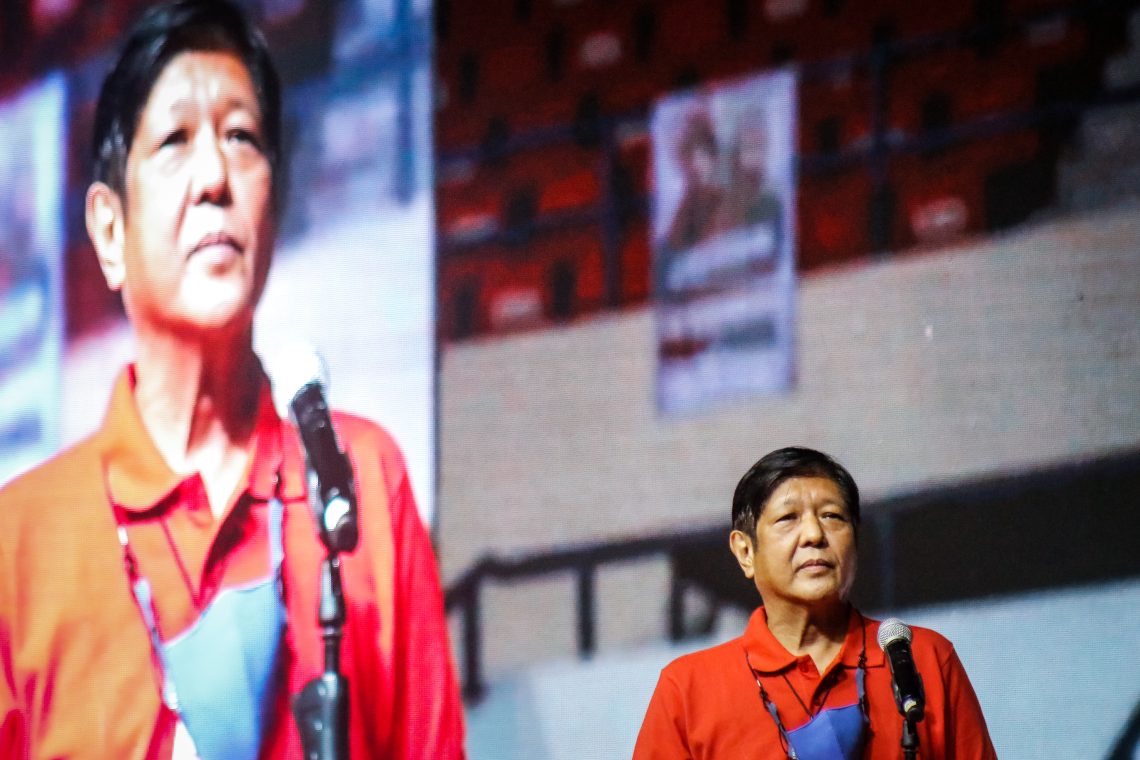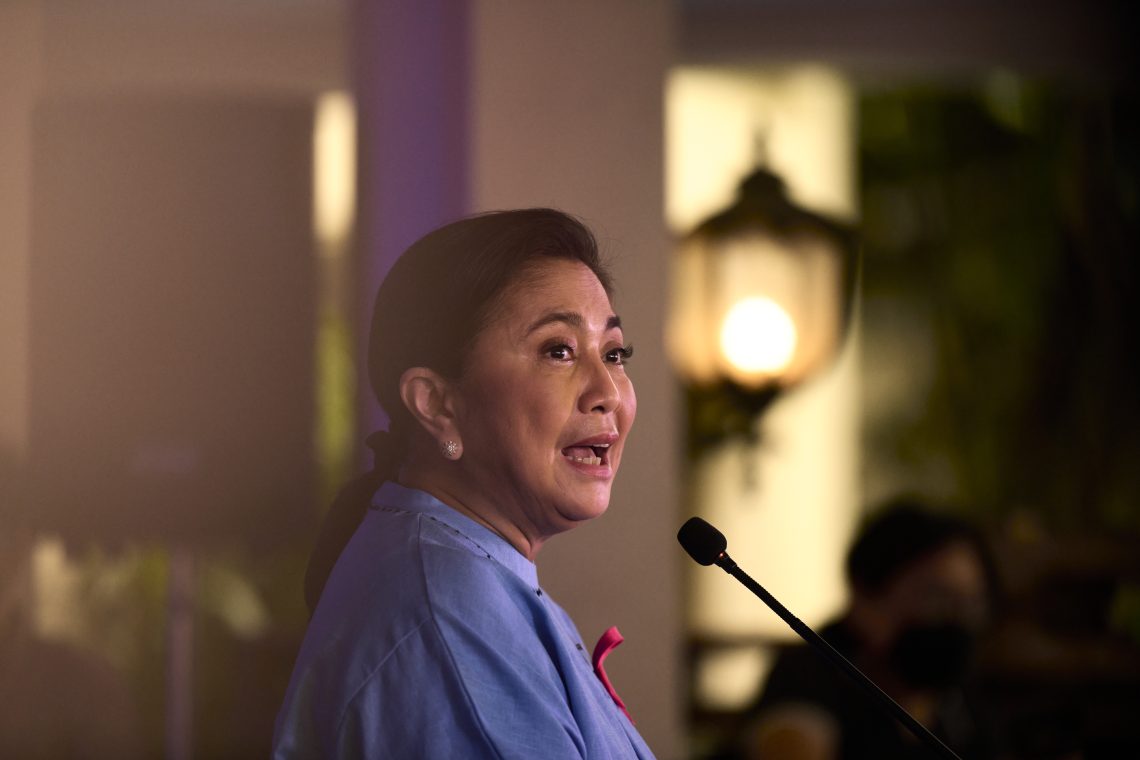Scenarios for a post-Duterte Philippines
Of the five main candidates running for president in the Philippines election this May, none seem likely to upend relations with Washington like Rodrigo Duterte did at the beginning of his presidency. But how far will each go in trying to accommodate Beijing?

In a nutshell
- All of the candidates are likely to be more pro-U.S. than Duterte
- Bongbong Marcos may hold a grudge against Washington
- Whoever wins will try to keep relations with China on a positive footing
Since the shocking developments of Philippine President Rodrigo Duterte’s first year in office, during which he declared his country’s “separation” from the United States, quite a bit has happened. When the next president of the Philippines takes office in June of next year, he or she will face a much different context than Mr. Duterte set out to create.
The most consequential change is the transition in the U.S.-Philippines alliance from damage control over President Duterte’s outbursts to rapprochement and a rekindled wariness of Beijing. All things being equal, none of the major candidates for president next year will change this trajectory. That said, all things may not remain equal.
Duterte’s turn back to the U.S.
President Duterte’s famous anti-Americanism peaked on February 11, 2020, when he formally announced his intention to abrogate the U.S.-Philippines Visiting Forces Agreement (VFA), which operationalizes the U.S.-Philippines Mutual Defense Treaty (MDT). While its termination would have had no legal impact on the treaty itself, it would have seriously hampered military cooperation and killed any prospect of expanding it.
However, President Duterte’s stance changed. Having delayed the termination three times, during a July 2021 visit to the Philippines by U.S. Secretary of Defense Lloyd Austin, the Duterte government extended the VFA indefinitely. The allies then doubled down in November with the conclusion of a Joint Vision Statement that highlighted the importance of the VFA and the MDT and recommitted to the build-out of shared military infrastructure in the Philippines, enhancing the capabilities of the Philippine armed forces, and further promoting the interoperability of their armed forces.
The turn in developments was more gradual than it appeared. Throughout Mr. Duterte’s presidency, at the cabinet and working levels, the U.S. and the Philippines cooperated to maintain as much of the security relationship as possible. Early in the Duterte administration, the frequency, scale, substance and U.S. contribution to joint military exercises were adjusted to address the president’s objections. By 2019, these exercises had largely returned to normal and increased in number. Meanwhile, the Philippines remained the largest recipient of U.S. military assistance in East Asia and the Pacific.
What sealed the turn – by Mr. Duterte’s own assertion – was the U.S.’s delivery of Covid-19 vaccines.
Many factors underpin the durability of the U.S.-Philippines relationship. They include a shared history, trade and investment ties, extensive family connections, legal alliance instruments like the MDT, and an extensive military-to-military relationship. Washington provided direct assistance to the Philippines to help it put down a violent insurgency in the south of the country in 2017, thereby underscoring the importance of the relationship. U.S. statements of support for the Philippines in the face of Chinese threats in the South China Sea also proved timely reminders of the benefits the ties bring. What sealed the turn – by Mr. Duterte’s own assertion – was the U.S.’s delivery of Covid-19 vaccines.
Next president of the Philippines
There are five main candidates for next year’s presidential election. Each of them has a more positive view of U.S.-Philippine relations and more skeptical of China’s role in the region than Mr. Duterte was in 2016.
The most uncertain on this narrow spectrum is Ferdinand “Bongbong” Marcos Jr., the son of former President-turned-dictator and target of the 1986 revolution, Ferdinand Marcos. Bongbong Marcos was President Duterte’s vice presidential running mate and the runner-up in the 2016 vice presidential race. Rumors – no doubt fed by his opponents – are rife in Manila that he is Beijing’s favored candidate.
Mr. Marcos’ running mate in the 2022 election is President Duterte’s daughter and successor as mayor of Davao City, Sara Duterte-Carpio. The natural assumption is, therefore, that President Duterte supports Mr. Marcos’ candidacy. The president’s backing, however, cannot be taken for granted. Mr. Duterte, a presence that looms over the election, is keeping his options open.
The candidate who presents the most certainty is current Vice President Leni Robredo. Early in their time in office, she and President Duterte broke off communication. Ms. Robredo was expelled from cabinet meetings on the president’s suspicion that she was plotting against him.
In the current election, she is running as an independent, despite her membership in the Liberal Party. The Liberal Party is one of the Philippines’ two legacy political parties. It is associated with its support for the 1986 People Power movement, and was the party of Mr. Duterte’s predecessor, Benigno (Noynoy) Aquino III – the son of the movement’s hero President Corazon Aquino.

In the middle is former actor and mayor of Manila, Isko Moreno. Mr. Moreno is rumored to be the candidate that President Duterte secretly favors. The suspicion that Mr. Duterte may prefer a candidate that is not heading his daughter’s ticket is driven in part by an estrangement between President Duterte and Mr. Marcos. In Filipino politics, although the president and vice president run as a ticket, they are elected separately. It is therefore entirely possible for President Duterte to support both Mr. Moreno and his daughter’s vice-presidential bid.
Many also believe that Mr. Moreno is favored by Chinese-Filipino tycoons, who many in the Philippines believe represent the interests of Chinese nationals. However, it is more likely that the tycoons are betting on more than one candidate.
Two other candidates in the running are legendary boxer Senator Manny Pacquiao, and Senator Panfilo (Ping) Lacson. Senator Pacquiao, despite his recent political experience, is a blank slate. He is well disposed to the U.S., if for no other reason than he owns homes there and made his fortune in the American boxing industry. Having once enjoyed President Duterte’s support, the two split on Mr. Pacquiao’s criticism of the president for corruption and his soft approach to China.
Senator Lacson has an extensive resume. In addition to serving almost 20 years as a senator, Mr. Lacson ran for president before, in 2004. He also spent 32 years in law enforcement, including as chief of the Philippine National Police.
Scenarios
Scenario 1: Better than Duterte, but risky
This scenario revolves around a win for Mr. Marcos. Just going by the polls, which are especially subject to error at this stage, the most likely election outcome by far is a Marcos victory.
In this scenario, as president, Mr. Marcos will provide continuity with a traditional Philippine hedging strategy. The Philippines has an alliance with the U.S. At the same time, it seeks a positive relationship with China. It does this mainly for economic reasons, but also out of concern that its relationship with Washington does not become so close as to encroach on sovereignty. Mr. Marcos will reach out to China, and the Chinese will be eager to engage him.
The wild card here is Mr. Marcos’ feelings about the United States. Mr. Marcos may hold a grudge for the way his father and family were treated by the U.S. upon being forced from power. The U.S. was instrumental in his father’s downfall in 1986, but until that point had been a stalwart supporter of his regime. Little of the abuses that led to President Marcos’ fall from power was unknown to the U.S. government.
Further complicating this scenario are legal charges in the U.S. against Mr. Marcos stemming from a 1995 judgment finding the Marcos family responsible for $2 billion in compensation for human rights abuses committed under his father’s regime. For many years, these charges have effectively prevented Mr. Marcos from visiting the U.S.
Under the administration of the younger Marcos, this background might not affect U.S.-Philippines relations. If Mr. Marcos wins, what will matter most is the people he appoints to his cabinet, most likely friends of the U.S. In contacts with China, Manila will assert Philippine interests – in the South China Sea, for example – but try to limit their impact on the relationship.
On the other hand, a hostile American reception for Mr. Marcos could encourage the Philippines to accommodate the Chinese, including when it comes to claims in the South China Sea. That would almost certainly involve ignoring the 2016 ruling by the Permanent Court of Arbitration that supported the Philippines’ claims. Without U.S. backing, Manila has little alternative.
How American civil society and Congress treat the scion of the old Marcos regime, and how the U.S. administration reacts to that treatment, will go a long way to determining Manila’s own approach. Friends of the Philippines and willing U.S. administrations have fought through challenging times in relations since 1986, most recently the fallout from President Duterte’s murderous drug war. They can make it through this. But under Mr. Marcos, the relationship may be tested again.
Scenario 2: Return to pre-Duterte
The most likely context for this scenario is a victory by Leni Robredo – who beat Mr. Marcos in 2016 in the national election for vice president and has powerful organizational assets that could change the race. There is also an outside chance that other candidates could drop their own bids and form a coalition around hers.
Ms. Robredo does not have Mr. Marcos’ liabilities in relation to the U.S. She is also seen as an anti-Duterte candidate. This may be a mixed blessing in the Philippines, where President Duterte remains immensely popular. In Washington, it is an asset, especially given Ms. Robredo’s criticism of President Duterte’s drug war. Conversely, Beijing already highly distrusts Ms. Robredo. Her party is itself suspect there. The last Liberal president – Noynoy Aquino – presided over a downturn in Philippines-China relations. In this scenario, Ms. Robredo sustains and extends the current improvement in U.S.-Philippines relations.
There is always a human rights-focused constituency in the U.S. that favors a critical approach to the Philippines no matter who is president. That group will continue to press its case in Congress. But with Ms. Robredo as president, they will not gain enough traction to disrupt relations.
The risk in this scenario is one of unrealistic expectations on the U.S. side. As president, Ms. Robredo will have to avoid being portrayed as an American surrogate. New initiatives with the U.S., even the extension of commitments in the recent Joint Vision Statement negotiated by the Duterte government, will arouse debate and dispute. Ms. Robredo will remain subject to the same restraints as President Aquino, whose initiative for developing U.S.-Philippines military cooperation was held up for two years by the Filipino courts.
Ms. Robredo will also seek a positive relationship with China, if one heavily conditioned on Philippine security interests. And, as long as she stays clear of its red lines on Taiwan, Tibet, and Xinjiang, despite their suspicions, China will welcome her. This China-Philippines dynamic could create misunderstanding and disappointment in the U.S.
Other scenarios
If any of the remaining three candidates are elected, scenarios for their presidencies would fall somewhere along the spectrum between Mr. Marcos’ and Ms. Robredo’s.
Ping Lacson’s long service in the police will be a rich target for human rights groups, which would complicate relations.
Isko Moreno has no liabilities that would hurt relations with the U.S., yet neither is he the known quantity that Ms. Robredo is in Washington. From Beijing’s point of view, Mr. Moreno does not possess Ms. Robredo’s limitations. He also appears to have already made some progress in playing toward Beijing’s preferences. For these reasons, Mr. Moreno starts off in a better place than Ms. Robredo with Beijing, and as president will be hard-pressed not to try to take advantage of it.
As noted, Mr. Pacquiao is a blank slate, but one can assume he will be on the American-friendly side of the spectrum.








